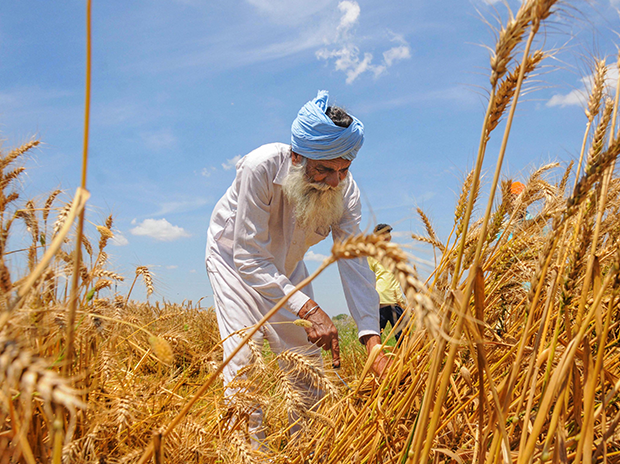After a marginal increase in April, wheat, flour, and maida prices have declined by 10 per cent in May due to a record high wheat harvest and a massive surge in its distribution through the public distribution system (PDS) and destruction in demand on the nationwide lockdown.
Data compiled by the Ministry of Consumer Affairs, Food and Public Distribution showed model wheat prices shed 12 per cent between March and May to trade currently at Rs 22 a kg as against Rs 35 in March, that is, before the coronavirus (Covid-19) pandemic started spreading in India. Flour (atta) has become cheaper by 6.7 per cent during the period from Rs 30 a kg in March to Rs 28 now. Prices of both wheat and atta had moved up slightly due to lean season demand in the pre-Covid period.
The price decline has brought major relief to middle-class consumers at a time when Covid-19 has rendered millions of people jobless and millions of others underwent pay cuts due to the nationwide lockdown, resulting in closure of factories, wholesale and retail stores for production and sale of goods.
“Flour and atta prices marginally jumped in - March period due to lean season demand. But, record rabi harvesting of wheat and its increased distribution at a free and discounted price through the public distribution system (PDS) has pulled down their prices by around 10 per cent since their March peak,” said Sanjay Puri, President, Roller Flour Mills Federation, the representative body of around 4000 wheat processors across the country.
Wheat prices in Delhi declined by 4.2 per cent to trade at Rs 23 a kg in May as against Rs 24 a kg in March and April, as per the Ministry of Food data. Similarly, flour prices have fallen by 3.6 per cent to trade at Rs 27 a kg now from Rs 28 a kg in March.
Interestingly, wheat and flour prices in Mumbai have jumped by 9.4 per cent and 5.9 per cent to Rs 35 a kg and Rs 36 a kg in Mumbai now as compared to Rs 32 a kg and Rs 34 a kg in February respectively.
Roller flour mills have also witnessed a sharp decline in their ex-factory prices of flour to Rs 22.75 a kg now from its level of Rs 24.50-25 a kg in March and April. Mills are selling maida at Rs 22.60 a kg in north India.
Meanwhile, maida prices have declined sharply due to demand destruction following the closure of its major consuming sectors like bakery, biscuits makers, and roadside street vendors of cookies, bhel/pani puri, sandwich etc where maida is consumed as high as 20-30 per cent of its overall countrywide production.
“Owing to weak demand, flour millers have reduced their operating capacity to their minimum level of 25-30 per cent now. Institutional demand which contributes significantly to India’s overall flour and maida consumption in the form of biscuits, cookies and bread has completely destroyed. While larges corporate including ITC, Adani and Cargill are operating, medium and small size enterprises are struggling to operate due to shortage of labour or packaging materials. As and when demand resumes, flour millers would increase their operating capacity,” said Ajay Goyal, Shivaji Roller Flour Mills.
D Manikchand, managing director of Panchaganga Roller Flour Mills, a Belgaum (Karnataka) based flour miller, believes that the lower capacity utilisation may create a shortage of flour, maida and other wheat derivatives in coming future.
Meanwhile, the government has allocated a huge quantity of wheat for free and subsidized rates of Rs 2 and Rs 3 for rice and wheat respectively to migrant workers and ration cardholders across the country.
“A majority of quantity of such wheat and rice is coming back to system once again which reduced demand for flour from roller flour mills. Instead of distributing it free, the government should reduce OMSS (open market sale system) price of wheat by Rs 5 a kg which would make it available cheap for consumers. Through this, roller flour mills would also survive. This will be a win-win situation for all stakeholders in the system,” said Puri.
To boost PDS supply, the government owned Food Corporation of India (FCI) has procured 35.1 million tonnes so far this rabi marketing season of an estimated 106 million tonnes of India’s record high wheat output. With this, total wheat stock in FCI’s central pool stands at 47.94 million tonnes and rice inventory of 27.23 million tonnes.
